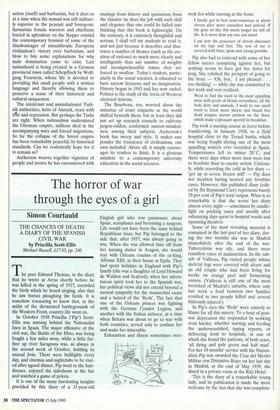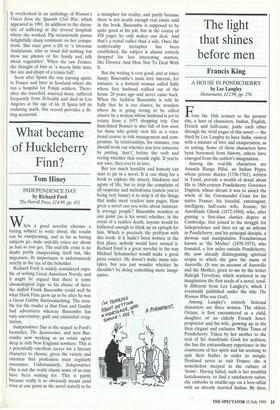The horror of war through the eyes of a girl
Simon Courtauld
THE CHANCES OF DEATH: A DIARY OF THE SPANISH CIVIL WAR by Priscilla Scott-Ellis Michael Russell, £17.95, pp. 240 The poet Edward Thomas, in the diary that he wrote at Arras shortly before he was killed in the spring of 1917, recorded the birds which he heard singing, also that he saw horses ploughing the fields. It is somehow reassuring to know that, in the midst of the devastated battlegrounds of the Western Front, country life went on.
In October 1938 Priscilla (Pip') Scott- Ellis was nursing behind the Nationalist lines in Spain. The major offensive of the civil war, the Battle of the Ebro, was being fought a few miles away, while a little fur- ther up river Saragossa was, as always in the second week of October, holding its annual feria. There were bullfights every day, and cinemas and nightclubs to be visit- ed after agood dinner. Pip went to the hair- dresser, enjoyed the sideshows at the fair and watched a game of pelota.
It is one of the many fascinating insights provided by this diary of a 21-year-old English girl who was passionate about Spain, aeroplanes and becoming a surgeon. Life would not have been the same behind Republican lines; but Pip belonged to the side that, after 1937, was always going to win. When she was allowed time off from her nursing duties in Aragon, she would stay with Orleans cousins of the ex-king, Alfonso XIII, at their house at Epila. They had spent holidays in England with Pip's family (she was a daughter of Lord Howard de Walden and Seaford); when her adven- turous spirit took her to the Spanish war, her political views did not extend beyond a natural sympathy for the monarchist cause and a hatred of the 'Reds'. The fact that one of the Orleans princes was fighting with the German Condor Legion, and another with the Italian airforce, at a time when Britain was about to go to war with both countries, served only to confuse her and make her miserable.
Exhaustion and illness sometimes over- took her while nursing at the front.
I finally got to bed semi-conscious at about eleven after more casualties had arrived. If life goes on like this much longer we will all die. It is more than any one can stand.
I am now the possessor of eleven abscesses on my legs and feet. The rest of me is covered with bites, spots and young growths.
Pip also had to contend with some of her fellow nurses conspiring against her, but nothing seems to have got her down for long. She relished the prospect of going to the front — 'Oh, boy, I am pleased . . . too thrilling' — while she was committed to her work and very resilient.
Went to find the ward in the most appalling mess with pools of blood everywhere, all the beds dirty and unmade. I went to our small ward to fetch more sheets and found five dead corpses strewn anyhow on the floor, which made a pleasant aperitif to breakfast.
Pip took a nursing course at Jerez before transferring, in January 1938, to a field hospital close to the Teruel battle, which was being fought during one of the most appalling winters ever recorded in Spain. Temperatures fell to minus 20°C, and there were days when more men were lost to frostbite than to enemy action. Curious- ly, while recording the cold in her diary — 'got up at seven, frozen stiff' — Pip does not mention having treated any frostbite cases. However, this published diary (edit- ed by Sir Raymond Carr) represents barely 20 per cent of Pip's total output. What is so remarkable is that she wrote her diary almost every night — sometimes by candle- light on packing cases and usually after exhausting days spent in hospital wards and operating theatres.
Some of the most revealing material is contained in the last part of her diary, dur- ing the two months she was in Madrid immediately after the end of the war. Tuberculosis was rife, and there were countless cases of malnutrition. In the sub- urb of Vallecas, Pip visited people whose skeletal legs were covered with ulcers and an old couple who had been living for weeks on orange peel and fermenting onions. (Vallecas is still one of the most wretched of Madrid's suburbs, where only last week a feud between two families resulted in two people killed and several hideously injured.) In Pip's eyes the 'Reds' were entirely to blame for all this misery. To a bout of post- war depression she responded by working even harder, whether nursing and feeding the undernourished, typing reports, or delivering food to hospitals, in one of which she found the patients, of both sexes, 'all dying and pale green and half mad'. For her 18 months' service with the Nation- alists Pip was awarded the Cruz del Merito Militar con Distintivo Rojo; on her last day in Madrid, at the end of May 1939, she dined in a private room at the Ritz Hotel.
This is the diary of a remarkable young lady, and its publication is made the more welcome by the fact that she was complete- ly overlooked in an anthology of Women's Voices from the Spanish Civil War, which appeared in 1991. In addition to the chron- icle of suffering at the several hospitals where she worked, Pip occasionally passes delightfully sharp comment on her compa- triots. She once gave a lift to 'a tiresome Andalusian, who as usual did nothing but show me photos of his family and talk about vegetables'. When she saw Franco, she thought of him as 'a weeny little man, the size and shape of a tennis ball'.
Soon after Spain she was nursing again, in France and later in Scotland where she ran a hospital for Polish soldiers. There- after she travelled, married twice, suffered frequently from ill-health and died in Los Angeles at the age of 66. If Spain left its enduring mark, this record provides a fit- ting memorial.



















































 Previous page
Previous page